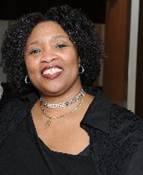
I pleaded with the Eternal at that time, saying, “O Eternal God, You who let Your servant see the first works of Your greatness and Your mighty hand, You whose powerful deeds no god in heaven or on earth can equal! Let me, I pray, cross over and see the good land on the other side of the Jordan, that good hill country, and the Lebanon.”
-- Deuteronomy 3:23-25
Often, Black women in America must shift who they are at the door when they enter white dominant spaces that set the standards for beauty, etiquette, and overall societal norms. This week’s Torah portion, Va’et’chanan, made me wonder: Does this shift take place in Jewish spaces as well?
Growing up in Mississippi, this act of shifting happened pretty effortlessly and seamlessly – if it didn’t, it would be nearly impossible for us to be taken seriously, land a “good” job, or be promoted. Shifting was easier in the South; it was just a part of how things were. Perhaps it was easier because there always was a safe space somewhere to connect with friends and family and just be myself.
As a Jew of Color, I often find myself wondering if I need to make this shift in Jewish spaces as well. I most certainly encounter unconscious bias, sexism, and racism in Jewish spaces, but the thought of having to shift yet again is unsettling.
My rabbi, Rabbi Danny Zemel of Temple Micah in Washington, D.C., recently wrote an article in the synagogue’s newsletter. In “The Challenge in Defining What Makes Us Jewish Today,” Rabbi Zemel shares thoughts about how Jewish identity has been constructed primarily through the lens of ethnicity, but many factors, including acculturation and intermarriage are changing that notion. He offers this thought on the “faith principles” of contemporary American Jews:
“The ‘faith principles’ are as follows: 1) God is the guarantor that all human life is priceless, 2) Mitzvah is the language of Jewish purpose and obligation, 3) Simcha is the understanding that we revel in the gift of life, and 4) Torah study, in its many facets, is crucial and vital, and we yearn to teach this to our children diligently.”
Although he doesn’t believe that Jews are the only ones who share these values, the vast culture that is our Jewish inheritance teaches us these values exceptionally well in story, law, ritual, and song.
Rabbi Zemel’s "faith principles" and their many modes of expression ring true for me and my intersectional identity as a Black woman who is Jewish. My interpretation of what it means to be Jewish, practice Judaism, and live a Jewish life as a Black woman includes:
- Telling my story of slavery, which includes the memory of my enslaved ancestors in the United States and Egypt
- Following the laws of Torah and living out the values through Delta Sigma Theta, a Black sorority founded to provide service and support to communities worldwide
- Participating in Jewish holidays (e.g., Black/Jewish seders) and doing other things that represent the various components of my identity, such as serving bagels, lox, and grits at gatherings
- Bringing attention to my intersectional identity
- Expressing myself through song and finding a band that plays Klezmer, jazz, and hip-hop music (but not all at once!)
I want to be clear: I find many Jewish spaces open, warm and welcoming. I feel very at home and part of the community. When I enter them, I do not want to totally redecorate the room; it is beautiful as it is. However, I would like to rearrange the furniture, add a throw pillow or two to the sofa, and put some new pictures on the wall. I believe that such decorative touches – our cultural identities and the questions we ask each other about them – strengthen who we are as Jews and the communities to which we belong, as well as help us better understand our own and others’ Jewish lives and journeys.
Just as you now know a bit about my experiences and identity, I challenge all of us to take time to get to know one another better. This is especially important for those who appear to be different, as we all strive to “see the good land on the other side of Jordan.”
Related Posts

Harnessing the Power of our Mothers Around the Seder Table

Melding Tradition and Innovation: Our Interfaith Toddler Naming Ceremony


